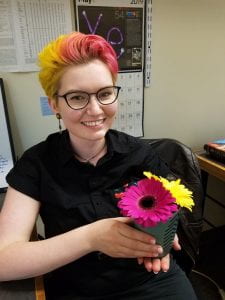Chemistry graduate student Checkers Marshall has been selected as the next recipient of the Rosaria Haugland Graduate Research Fellowship.
The Haugland Fellowship is a prestigious award. It is the first graduate research fellowship ever awarded by the UO Chemistry and Biochemistry Department and made possible by a generous gift from Dr. Rosaria Haugland. Dr. Haugland is the co-founder of Molecular Probes, which was a Eugene company founded in 1975 that is now part of Thermo Fisher’s Invitrogen brand. Checkers was selected from a highly accomplished pool of applicants for excellence in research on metal organic framework nanoparticles, coursework, and ongoing activities that embody the intent of the Haugland award.

We asked Checkers to tell us a little about themselves and their science.
I grew up in Denver, a city with a vibrant artistic community. In my high school years, I performed slam poetry at open mics and fell in love with the art of fire spinning. My interests in chemistry and art share a common theme: symmetry. I am designing a series of interactive workshops, Point Groups for Props, to teach performance artists how to apply group theory to their props: hula hoops, juggling clubs, and more can be easily categorized by their symmetry operations. My main props are Russian fire fans, which have a point group of C2V.
I received my BS in Chemistry from Fort Lewis College, a small liberal arts institution in the San Juan mountains in Colorado. I excelled in my first semester of chemistry under Dr. Aimee Morris, who asked me to TA general chemistry lab the following term. This simple act catalyzed my academic career; I am forever grateful to Dr. Morris and the other incredible professors I had at FLC who encouraged my progress and pushed me to become a better scientist. I enjoyed a relatively diverse community at FLC. Many of my professors were women, and because the college gives free tuition to Indigenous students, many of the folks I talked science with were of Indigenous descent. Today I aim to use my position to elevate the voices of the underrepresented and to create a welcoming environment in the traditionally exclusive world of academic science.
Current Research
I joined Dr. Carl Brozek’s research lab as his first student during the summer of 2018. My research focuses on nanoparticles of highly porous materials known as metal-organic frameworks (MOFs). Understanding how MOF nanoparticles grow allows us to design rational syntheses that target specific particle sizes and functionalities. One of the most promising applications of MOF particles is in gas separation membranes, which must be very thin to be applicable in industrial settings. Controlling particle size is therefore an important step in this direction. I am particularly interested in MOFs that are capable of charge transport; conductive, porous, well-ordered materials are attractive for energy-dense charge storage devices. I am currently developing a model system to study ionic and electronic charge transport in assemblies of porous MOF particles. I believe this fundamental work will pave the way towards the integration of MOFs in electronic devices.
What’s next?
I am keeping my options open, but I aim to join a small company or start-up in sustainable technology that would benefit from my skill set. Regardless of what I choose to do in my scientific career, I hope to return to the Rocky Mountains, get a cat, and continue my journey in the performing arts.

